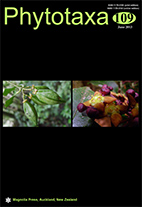Abstract
Kappa carrageenan is an important phycocolloid extracted from the red seaweed Kappaphycus alvarezii. This species has been introduced into several regions, most recently in Brazil. The remote invasive potential of this seaweed in both south and southeast waters of Brazil (subtropical regions) has been established, but introduction in the northeastern tropical area is contested due to the absence of biological information. An unknown exotic lineage of K. alvarezii has been illegally introduced and cultivated in an area characterized by the presence of coral reefs in Paraíba, the northeastern Brazilian coast, since the beginning of the last decade. This work focuses on the molecular identification of these samples in comparison with sequences of other strains of K. alvarezii and congeners available in Genbank. Maximum likelihood (ML) and Bayesian inference (BI) analyses showed strong similarities between K. alvarezii cultivated in the tropical waters in Brazil and those lineages cultivated in Hawaii, Venezuela, Malaysia and Tanzania that have never shown invasive behavior. However, more detailed investigations and use of environmental monitoring are recommended before commercial cultivation of this species can be authorized in tropical region of Brazil.

